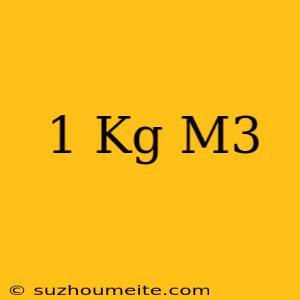1 Kilogram (kg) Equals How Many Cubic Meters (m3)?
In everyday life, we often encounter units of measurement such as kilograms (kg) and cubic meters (m3). While they are both units of measurement, they represent different physical quantities: mass and volume, respectively. In this article, we will explore the relationship between 1 kilogram (kg) and cubic meters (m3).
What is a Kilogram (kg)?
A kilogram is a unit of mass in the International System of Units (SI). It is defined as the mass of a particular cylinder of platinum-iridium alloy, which is kept at the International Bureau of Weights and Measures (BIPM) in France. The kilogram is a fundamental unit of mass, and it is widely used in many fields, including science, engineering, and commerce.
What is a Cubic Meter (m3)?
A cubic meter is a unit of volume in the International System of Units (SI). It is defined as the volume of a cube with a length, width, and height of one meter each. The cubic meter is a derived unit, which means it can be expressed in terms of other fundamental units. In this case, it is equal to the volume of a cube with a length, width, and height of one meter each.
The Relationship Between kg and m3
Now, let's discuss the relationship between 1 kilogram (kg) and cubic meters (m3). Unfortunately, there is no direct conversion between the two units because they represent different physical quantities. Kilograms measure mass, while cubic meters measure volume.
However, we can consider a specific scenario to help illustrate the relationship between the two units. Let's take a material with a known density, such as water. The density of water is approximately 1 gram per cubic centimeter (g/cm3) or 1 kilogram per liter (kg/L).
Using this density, we can calculate the volume of 1 kilogram of water:
1 kg of water = 1 liter (L) = 0.001 cubic meters (m3)
So, 1 kilogram of water occupies a volume of approximately 0.001 cubic meters.
Conclusion
In conclusion, 1 kilogram (kg) is not directly equivalent to a specific volume in cubic meters (m3). However, by considering a material with a known density, such as water, we can establish a relationship between the two units. In the case of water, 1 kilogram occupies a volume of approximately 0.001 cubic meters.
